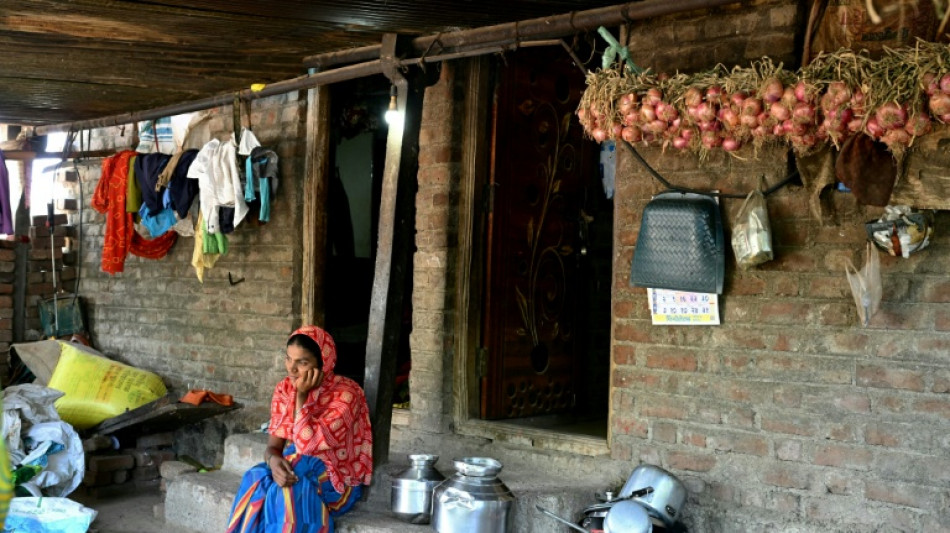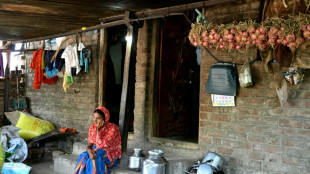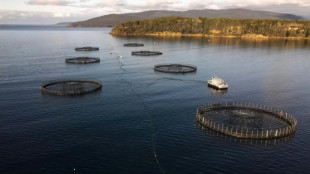
-
 Chivu leaves Parma ahead of Inter Milan move
Chivu leaves Parma ahead of Inter Milan move
-
Hitchcock heroine Novak awarded Venice lifetime achievement award

-
 UK to boost 'homegrown talent' in new AI skills drive
UK to boost 'homegrown talent' in new AI skills drive
-
Beaten Sinner extends lead on Alcaraz at top of ATP rankings

-
 Strycova to replace Pala as Czech Billie Jean King Cup team captain
Strycova to replace Pala as Czech Billie Jean King Cup team captain
-
Defence or environment? London faces spending choices

-
 'Tennis the winner' as Alcaraz and Sinner set for enduring rivalry
'Tennis the winner' as Alcaraz and Sinner set for enduring rivalry
-
Don't let deep sea become 'wild west', Guterres tells world leaders

-
 Chivu says goodbye to Parma ahead of Inter Milan move
Chivu says goodbye to Parma ahead of Inter Milan move
-
Iran says to submit own nuclear proposal to US soon

-
 Boisson jumps 296 places in WTA rankings after French Open run
Boisson jumps 296 places in WTA rankings after French Open run
-
China's exports slow as trade war takes toll

-
 Tangled humpback whale sparks rescue mission off Australia
Tangled humpback whale sparks rescue mission off Australia
-
Malaysia bus crash kills at least 15, mostly students

-
 Climate change heightens risk of Indian farmer suicides
Climate change heightens risk of Indian farmer suicides
-
Farmed production of some fish - and seaweed - is soaring

-
 Bust attributed to Donatello splits Slovakia
Bust attributed to Donatello splits Slovakia
-
Israel diverts Gaza-bound aid boat carrying Greta Thunberg

-
 China exports slow as trade war takes toll
China exports slow as trade war takes toll
-
'Maybe Happy Ending' tops Broadway's Tony Awards

-
 'Flawed' Test Championship reveals world cricket's underlying problems
'Flawed' Test Championship reveals world cricket's underlying problems
-
Retired great Hakuho says leaving sumo after bullying scandal

-
 Haliburton vows to improve after Thunder defense stifles Pacers
Haliburton vows to improve after Thunder defense stifles Pacers
-
Trump travel ban in effect, citizens from 12 nations barred from US

-
 McIntosh impresses in 800m free win at Canada trials
McIntosh impresses in 800m free win at Canada trials
-
NATO learns as Ukraine's 'creativity' changes battlefield

-
 Thunder rumble to 123-107 win over Pacers to level NBA Finals
Thunder rumble to 123-107 win over Pacers to level NBA Finals
-
Israel says Gaza-bound activist boat carrying Greta Thunberg redirected

-
 Chinese consumer prices continue to fall as US trade talks loom
Chinese consumer prices continue to fall as US trade talks loom
-
Thunder power past Pacers to level NBA Finals

-
 Asian markets rally ahead of latest China-US trade talks
Asian markets rally ahead of latest China-US trade talks
-
UN summit to tackle 'emergency' in world's oceans

-
 Alexandre de Moraes: Brazilian judge in showdown with far-right
Alexandre de Moraes: Brazilian judge in showdown with far-right
-
US, China seek to extend trade truce with London talks

-
 Irving Resources Announces Closing of Oversubscribed Non-Brokered Private Placement
Irving Resources Announces Closing of Oversubscribed Non-Brokered Private Placement
-
Cleaning Glow Sets the Standard for Home Cleaning Excellence in San Francisco with 2025 Consumer Choice Award

-
 Zedge's DataSeeds.AI Releases Foundational Dataset for Computer Vision and Generative AI in Collaboration with Perle.ai and Émet Research
Zedge's DataSeeds.AI Releases Foundational Dataset for Computer Vision and Generative AI in Collaboration with Perle.ai and Émet Research
-
Highlander Silver Commences Drilling at Bonanza Grade San Luis Gold-Silver Project

-
 Empire Metals Limited Announces Exceptional High-Purity TiO2 Product Achieved
Empire Metals Limited Announces Exceptional High-Purity TiO2 Product Achieved
-
Angle PLC Announces Posting of Annual Report and Notice of AGM

-
 Guardian Metal Joins Critical Minerals Forum
Guardian Metal Joins Critical Minerals Forum
-
Fox beats Burns on fourth playoff hole to win PGA Canadian Open

-
 Nations League victors Portugal toast Ronaldo's 'winner mentality'
Nations League victors Portugal toast Ronaldo's 'winner mentality'
-
Spain focused on World Cup after defeat, says coach

-
 New Zealand Rugby chief Robinson quits
New Zealand Rugby chief Robinson quits
-
Lewandowski to boycott national team under current coach

-
 Portugal beat Spain on penalties to win Nations League
Portugal beat Spain on penalties to win Nations League
-
Alcaraz puts French Open miracle down to 'real champions' mindset

-
 Kupcho ends LPGA title drought with Shoprite Classic crown
Kupcho ends LPGA title drought with Shoprite Classic crown
-
Alcaraz stuns Sinner in all-time great French Open final


Climate change heightens risk of Indian farmer suicides
On a small farm in India's Maharashtra state, Mirabai Khindkar said the only thing her land grew was debt, after crops failed in drought and her husband killed himself.
Farmer suicides have a long history in India, where many are one crop failure away from disaster, but extreme weather caused by climate change is adding fresh pressure.
Dwindling yields due to water shortages, floods, rising temperatures and erratic rainfall, coupled with crippling debt, have taken a heavy toll on a sector that employs 45 percent of India's 1.4 billion people.
Mirabhai's husband Amol was left with debts to loan sharks worth hundreds of times their farm's annual income, after the three-acre (one-hectare) soybean, millet and cotton plot withered in scorching heat.
He swallowed poison last year.
"When he was in the hospital, I prayed to all the gods to save him," said 30-year-old Mirabai, her voice breaking.
Amol died a week later, leaving behind Mirabai and three children. Her last conversation with him was about debt.
Their personal tragedy is replicated daily across Marathwada, a region in Maharashtra of 18 million, once known for fertile farmland.
Last year, extreme weather events across India affected 3.2 million hectares (7.9 million acres) of cropland -- an area bigger than Belgium -- according to the New Delhi-based Centre for Science and Environment research group.
Over 60 percent of that was in Maharashtra.
"Summers are extreme, and even if we do what is necessary, the yield is not enough," said Amol's brother and fellow farmer Balaji Khindkar.
"There is not enough water to irrigate the fields. It doesn't rain properly."
- 'Increase the risks' -
Between 2022 and 2024, 3,090 farmers took their own lives in Marathwada, an average of nearly three a day, according to India's Minister of Agriculture Shivraj Singh Chouhan.
Government statistics do not specify what drove the farmers to kill themselves, but analysts point to several likely factors.
"Farmer suicides in India are a consequence of the crisis of incomes, investment and productivity that you have in agriculture," said R. Ramakumar, professor of development studies at the Tata Institute of Social Sciences.
Farming across many Indian smallholdings is done largely as it has been for centuries, and is highly dependent on the right weather at the correct time.
"What climate change and its vulnerabilities and variabilities have done is to increase the risks in farming," Ramakumar said.
This "is leading to crop failures, uncertainties... which is further weakening the economics of cultivation for small and marginal farmers."
The government could support farmers with better insurance schemes to cope with extreme weather events, as well as investments in agricultural research, Ramakumar said.
"Agriculture should not be a gamble with the monsoon."
- 'Make ends meet' -
Faced with uncertain weather, farmers often look to stem falling yields by investing in fertilisers or irrigation systems.
But banks can be reluctant to offer credit to such uncertain borrowers.
Some turn to loan sharks offering quick cash at exorbitant interest rates, and risking catastrophe if crops fail.
"It is difficult to make ends meet with just farming," Mirabai said, standing outside her home, a tin-roofed hut with patch-cloth walls.
Her husband's loans soared to over $8,000, a huge sum in India, where the average monthly income of a farming household is around $120.
Mirabai works on other farms as a labourer but could not pay back the debt.
"The loan instalments piled up," she said, adding that she wants her children to find jobs outside of farming when they grow up.
"Nothing comes out of the farm."
The agricultural industry has been in a persistent crisis for decades.
And while Maharashtra has some of the highest suicide rates, the problem is nationwide.
Thirty people in the farming sector killed themselves every day in 2022, according to national crime records bureau statistics.
At another farm in Marathwada, 32-year-old farmer Shaikh Imran took over the running of the family smallholding last year after his brother took his own life.
He is already more than $1,100 in debt after borrowing to plant soybean.
The crop failed.
Meanwhile, the pop of explosives echoes around as farmers blast wells, hoping to hit water.
"There's no water to drink," said family matriarch Khatijabi. "Where shall we get water to irrigate the farm?"
L.Harper--AMWN